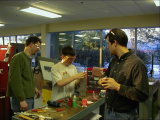Are you mentoring a current FIRST team or are you interested in becoming a FIRST mentor? Team 501’s mentors have put together the following list of tips to help other FIRST team’s mentors out.
- Mentoring is Coaching (Act as a role model)
- Mentoring is based on Trust and Respect
- Trust and respect is based on the premise that everyone is honest, respectful, and dependable.
- Mentoring is also based on adult and student relationships
- Always observe Gracious Professionalism
- Have Fun!
Mentors should have several goals including:
- Allow and encourage independent thought
- Develop “open” communication
- Foster a reciprocal relationship within the team
- Develop roles within the team
Adult/student relationships
- Know the responsibilities of both adults and students
- Adults are role models
- Adults must set example: Language, Professionalism, etc
- Students look up to adults for trust and respect
Mentors should also keep in mind that stress builds up during build seasons and competition. If you are feeling stressed, step back and take a breather. Always remember to keep yourself in “check” and that it is about the students and the team.
Mentor Roles
- Demonstrate to students the value of education
- Motivate and engage students in meaningful communication
- Create open communication
- Maintain focus
- Allow students to do most of the work within their abilities
- Maintain safety and quality
Four Phases of Mentoring (Shifting Roles)
- Mentor Does, Student Watches
- Mentor Does, Student Helps
- Student Does, Mentor Helps
- Student Does, Mentor Watches
Different Student Learning Styles
- Visual Learning (Learn by watching)
- Auditory Learning (Learn by listening)
- Kinesthetic Learning (Learn by doing)
Want more tips on mentoring? View the official FIRST mentoring guide by clicking here.

